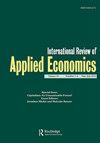基础设施发展对非洲国家的影子经济重要吗?
IF 1.4
Q3 ECONOMICS
引用次数: 2
摘要
了解非正规经济的决定因素是经济发展中的一个关键问题,因为它对发展努力具有深远的影响。以前的研究只关注那些可能降低影子经济相对规模的因素。然而,到目前为止,这些尝试在非洲并没有取得多大的成功,在那里,非正式活动继续蓬勃发展。我们认为,现实的中期目标,而不是强制性的正规化,可以通过提供足够的基础设施和友好的商业环境来增加非正规企业的产出,同时促进正规化。利用OLS、FE和系统GMM分析42个非洲国家2003-2018年的数据,我们发现基础设施发展降低了非洲国家影子经济的相对规模。当我们控制了非正式经济的其他决定因素的影响,使用其他估计器,并使用非正式经济的替代测量方法时,我们的结果仍然是一致的。本文章由计算机程序翻译,如有差异,请以英文原文为准。
Does infrastructure development matter for the shadow economy in African countries?
ABSTRACT Understanding the determinants of the informal economy is a crucial issue in economic development due to its far-reaching effects on development efforts. Previous studies focused exclusively on factors that can potentially reduce the relative size of the shadow economy. However, these attempts have not enjoyed much success to date in Africa, where informality has continued to thrive. We contend that realistic medium-term goals, as opposed to obligatory formalisation, could increase the output of informal businesses by providing enough infrastructure and a welcoming business climate, which would at the same time foster formalisation. Using OLS, FE and system GMM with data on 42 African countries covering 2003–2018, we find that infrastructure development reduces the relative size of the shadow economy in African countries. Our results remained consistent when we controlled for the effects of other determinants of the informal economy, employed other estimators, and used an alternative measure of the informal economy.
求助全文
通过发布文献求助,成功后即可免费获取论文全文。
去求助
来源期刊

International Review of Applied Economics
ECONOMICS-
CiteScore
4.30
自引率
4.50%
发文量
37
期刊介绍:
International Review of Applied Economics is devoted to the practical applications of economic ideas. Applied economics is widely interpreted to embrace empirical work and the application of economics to the evaluation and development of economic policies. The interaction between empirical work and economic policy is an important feature of the journal. The Journal is peer reviewed and international in scope. Articles that draw lessons from the experience of one country for the benefit of others, or that seek to make cross-country comparisons are particularly welcomed. Contributions which discuss policy issues from theoretical positions neglected in other journals are also encouraged.
 求助内容:
求助内容: 应助结果提醒方式:
应助结果提醒方式:


